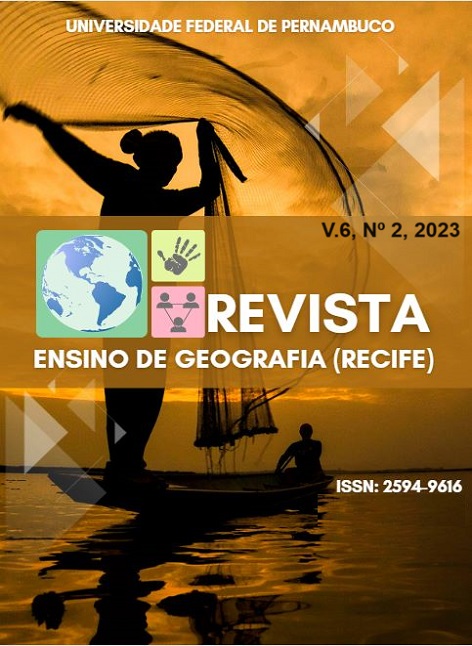How geography teachers understand teaching content: an analysis based on high school teaching plans
DOI:
https://doi.org/10.51359/2594-9616.2023.258507Keywords:
Geography, contents, teaching plans, analysisAbstract
In this article, we present the results of a research that was based on the analysis of Geography teaching plans, from the perspective of how teachers consider the teaching contents. We seek to strengthen dialogue with authors who discuss the topic, such as: Libâneo (2013); Sacristan (1998); Siqueira (2017); Zabala (1998) and Haydt (2011). For the analysis, according to the convenience of the researchers, Geography teaching plans for High School referring to the year 2022, from public schools in the cities of Juazeiro do Norte and Crato, located in Ceará, as well as documents that guide the their productions, namely the National Common Curricular Base - BNCC of Geography (BRASIL, 2018) and the Law of Guidelines and Bases - LDB of Education (BRASIL, 1996). From the analyses, we reaffirm the relevance that school planning has for the teaching and learning activity, since it implies projecting decision-making, from which guidelines are established to assist in the pedagogical act in the following dimensions: 1 - the contents to be taught; 2 – the choice of materials to be used; 3 – how to mediate the contents (methodology) and 4 – the number of classes, among other essential planning elements.
References
BRASIL. Ministério da Educação. Base Nacional Comum Curricular. Brasília: MEC, 2018.
BRASIL. Ministério de Educação e Cultura. LDB - Lei no 9394/96, de 20 de dezembro de 1996. Estabelece as diretrizes e bases da Educação Nacional. Brasília: MEC, 1996.
FREIRE, Paulo. Ação cultural para a liberdade. 5.ed. Rio de Janeiro, Paz e Terra, 1981. Disponívelem:http://www.gestaoescolar.diaadia.pr.gov.br/arquivos/File/otp/livros/acao_cultural_liberdade.pdf > Acesso em: 11 jan. 2023.
HAYDT, Regina Célia Cazaux. Curso de didática geral. São Paulo: Ática, 2011. Disponível em: https://laracoutouvv20162.files.wordpress.com/2016/07/curso-de-didatica-geral-regina-celia-c-haydt-1.pdf. Acesso em: 11 jan. 2023.
KAERCHER, Nestor André. A Geografia serve para entender a água, o sangue, o petróleo... Serve para entender o mundo, e, sobretudo, a nós mesmos!. In: FARIAS, Paulo Sérgio Cunha; OLIVEIRA, Marlene Macário de (organizadores). A Formação Docente em Geografia: Teorias e Práticas. Campina Grande: EDUFCG, 2014.
LIBÂNEO, José Carlos. Didática. 2. ed. São Paulo: Cortez, 2013.
NETO, Otávio Cruz. O trabalho de campo como descoberta e criação. In: DESLANDES, Suely Ferreira, et al. Pesquisa social: teoria, método e criatividade. Petrópolis, RJ: Vozes, 1994. Disponível em: https://wp.ufpel.edu.br/franciscovargas/files/2012/11/pesquisa-social.pdf . Acesso em: 11 jan. 2023.
SACRISTÁN, J. Gimeno. Plano do Currículo, Plano do Ensino: O papel dos professores/as. In: SACRISTÁN, J. Gimeno; Gómez A. L. Pérez. Compreender e Transformar o Ensino. Trad. Ernani F. da Fonseca Rosa. 4. ed. ArtMed, 1998.
SIQUEIRA, Santiago Alves de. O plano de ensino e a construção de conceitos na geografia escolar. Pesquisar - Revista de Estudos e Pesquisas em Ensino de Geografia. Florianópolis, v. 1, n. 1, p. 16-32. maio 2017, ISSN 2359-1870. © 2017. Universidade Federal de Santa Catarina. Disponível em: file:///C:/Users/Samia/Downloads/66651-Texto%20do%20Artigo-231183-1-10-20170531%20(3).pdf. Acesso em: 09 nov. 2022
ZABALA, Antoni. A prática educativa: como ensinar. Tradução Ernani F. da F. Rosa. Porto Alegre: Artmed, 1998.
Downloads
Published
How to Cite
Issue
Section
License
Copyright (c) 2023 Sâmia Eufrasio Barbosa, Regina Maria Vieira dos Santos, Tânia Cristina Meira Garcia, Djanni Martinho dos Santos Sobrinho

This work is licensed under a Creative Commons Attribution 4.0 International License.
Authors who publish with this journal agree to the following terms:- Authors retain copyright and grant the REVISTA ENSINO DE GEOGRAFIA (RECIFE) right of first publication with the work simultaneously licensed under a Creative Commons Attribution NonCommercial International 4.0 (CC BY-NC) that allows others to share the work with an acknowledgement of the work's authorship and initial publication in this journal.
- Authors are able to enter into separate, additional contractual arrangements for the non-exclusive distribution of the journal's published version of the work (e.g., post it to an institutional repository or publish it in a book), with an acknowledgement of its initial publication in this journal.
- Authors are permitted and encouraged to post their work online (e.g., in institutional repositories or on their website) prior to and during the submission process, as it can lead to productive exchanges, as well as earlier and greater citation of published work.



